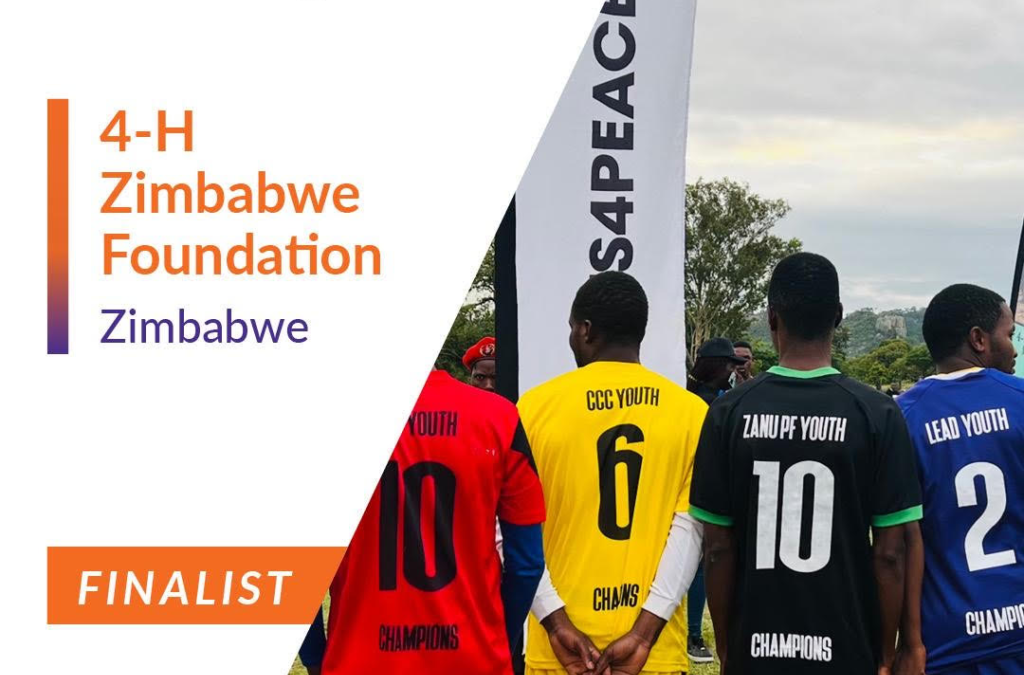
4-H Zimbabwe gets shortlisted by World Justice Project for strengthening the
Rule of Law foundation for Democracy.
For Immediate Release:
Harare – 20 May 2024: 4-H Zimbabwe Foundation has been recognized for its work in
Enhancing Meaningful Youth Participation in National Development, Peace
Building and Political Processes in Zimbabwe selected from a pool of 424
submissions from 109 countries, these exemplary projects were chosen for their
potential for replication and their demonstrated impact in advancing the rule of law by
World Just Project (WJP) through its World Justice Challenge. 4-H Zimbabwe
Foundation from Zimbabwe has made it to the top 30 finalists in the world, one of the 4
countries in Africa and the only organization in Zimbabwe.
The World Justice Challenge is a global competition and program of supporting
activities to identify, recognize and promote good practices and high-impact initiatives
that protect and advance the rule of law. The Challenge compiles an evidence base for
successful rule of law approaches, raises their strategic visibility, and strengthens an
emerging network of rule of law champions. The Challenge competition invites
submissions for initiatives that address critical rule of law challenges around the world in
particular thematic categories. For the 2024 competition, the theme is The Rule of Law:
Foundation of Democracy, focusing on effective strategies for strengthening the rule of
law to reverse autocracy and rebuild trust in democratic governance. In the final stretch
of the competition, finalists will be invited to showcase their projects this summer at the
2024 American Bar Association Annual Meeting in Chicago in August 2024. Five
winning projects will each receive a cash prize and opportunities to network and build
their global profile throughout the year.
Through dialogue and joint activities such as sport4peace tournaments, 4-H Zimbabwe
Foundation project facilitated unprecedented cooperation among 11 political parties.
This collaboration resulted in the signing of the groundbreaking Youth Peace Pledge
and the Zimbabwe Youth in Politics Charter on Peace in Electoral Processes which
created a youth engagement platform, the Youth Council for Peace and Development
(YCPD). In addition, the project successfully brought together rival student unions
(ZICOSU and ZINASU) through the National Students Council (NSC) to increase
awareness and understanding of democratic values, conflict resolution, and
peacebuilding strategies among students in Zimbabwe. This engagement has
contributed to a more peaceful and tolerant environment within university campuses and
beyond.
Programs Manager for 4-H Zimbabwe, Mr Didmus Dewa said “we would like to
appreciate the support and cooperation we have been receiving and still receiving from
the political parties in Zimbabwe. We appreciate the improvement in the level of
tolerance being shown by our political parties in our country. Secondly, we also
appreciate the support we have been receiving from our key strategic partners such as
National Peace and Reconciliation Commission (NPRC), Zimbabwe Republic Police
(ZRP) and traditional chiefs in ensuring success in our programming. Also, our funding
partners who made these programs possible. The recognition by this international
organization shows that 4-H Zimbabwe has made strides in development work around
youth democratic participation, peace, and development. This comes at the background
of our African Union (AU) recognition in 2023 for advancing youth peace and security
agenda in the region.”
He continued by saying that the shortlisting of 4-H Zimbabwe on this global World
Justice Project is a testament to the footprints of 4-H Zimbabwe in its Peace and
Governance interventions. This selection is so significant that it pitches our work and
impact at a global level and thus 4-H Zimbabwe visibility and growth is evident. We look
forward to this event and many more as we seek innovative catalytic and high impact
interventions to local, national and global challenges.
4-H Zimbabwe’s next steps involve conducting capacity-building programs for the Youth
Council for Peace and Development (YCPD) at national and provincial levels.
Subsequently, the organization will utilize the Council and Parliamentary Youth Quota
structures to facilitate continuous youth engagement on peacebuilding, inclusion in
national development, and political processes, particularly by establishing a Council for
the Harare, Bulawayo Metropolitan areas and other eight (8) provinces in Zimbabwe.


